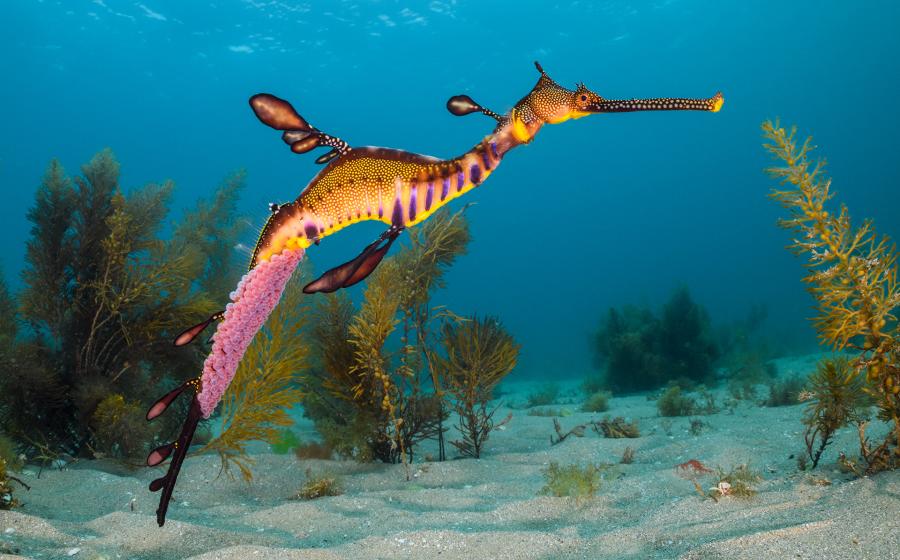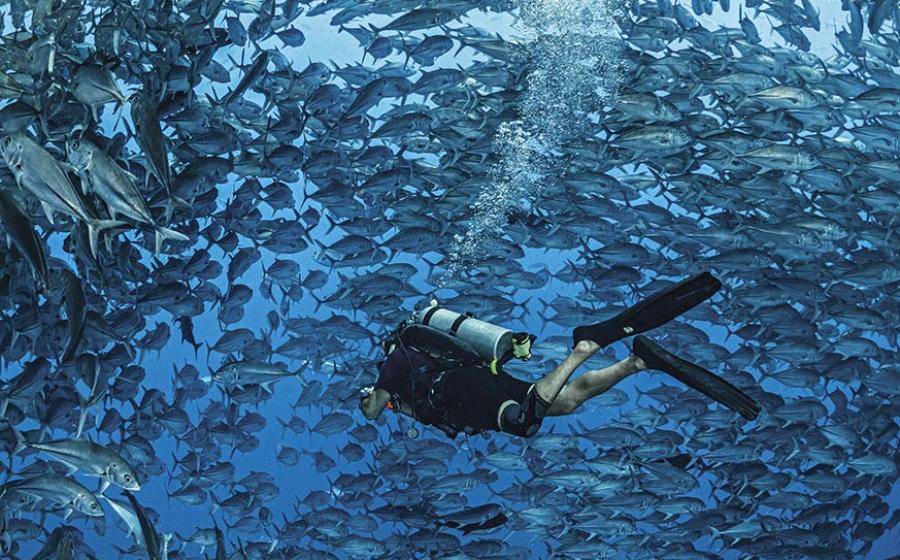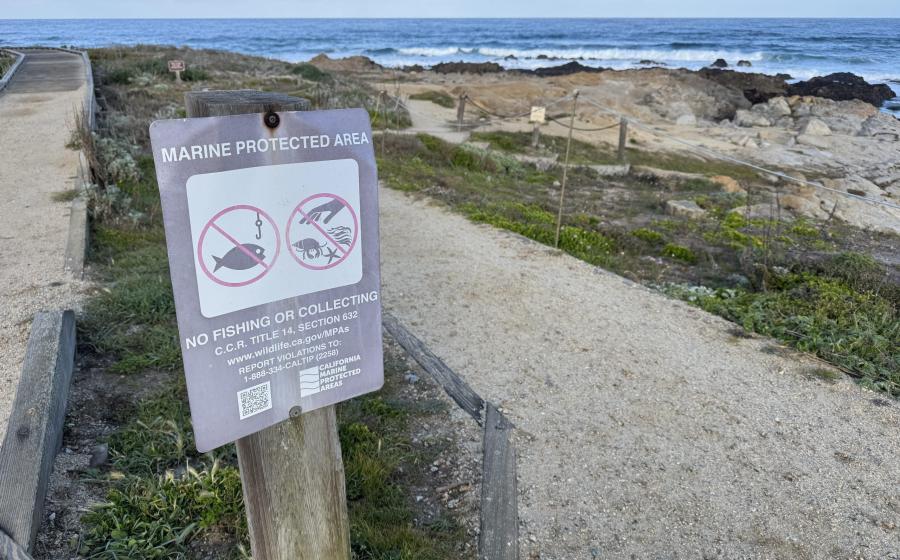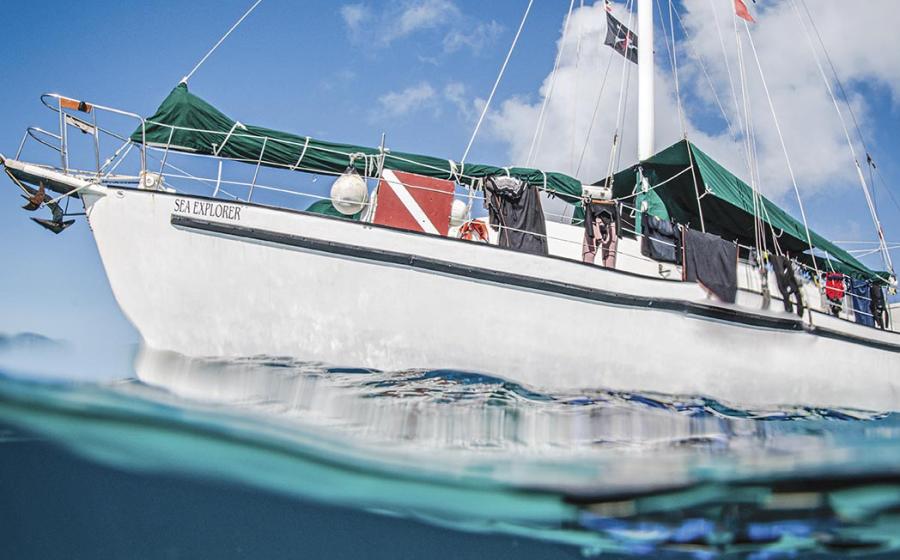Dive Into Adventure: Summer 2006

Got a diving question? Our resident dive pro has an answer.
By Michael Ange
Question:
I've heard divers always dive in pairs, so do I need a "buddy" to start lessons, or can I sign up on my own?
Answer:
It's true that recreational divers usually dive in pairs and that the other diver is referred to as your dive buddy. But no, you don't need to bring a partner to take classes or participate in the sport. Diving is a very social activity and when you arrive for your first scuba lesson, chances are there will be other students you can pair up with when you need to. By the end of the class, you'll have a whole new set of friends who are as eager to dive as you are, so finding a partner for future dives is a cinch.
Question:
I'm interested in learning to dive. There are three dive stores in my hometown--how do I know which one to use?
Answer:
By one estimate, there are 528 dive stores in the U.S., and while they come in all shapes and sizes, a good number of them are small "mom and pop" stores owned by good people who love to share the sport of diving with others. Any one of them can teach you to dive, but you want to find the one that will provide the best experience for you, and that takes a little legwork.
I suggest you pay each one a visit, because you can tell a lot about a dive shop just by walking in the door. Most dive stores aren't going to make the cover of Architectural Digest, but a good shop will be clean, neat and orderly. The right shop will look and feel like the kind of place you'd hang out in, because once you become a diver, chances are you'll be stopping in on a regular basis.
Next, pay attention to the staff. Their attitude is usually a direct reflection of the learning experience you'll receive. Walk up to the nearest employee and tell them you're interested in learning to dive. Ask any questions that you have. The staff at a good store will be responsive, courteous, knowledgeable and enthusiastic; never pushy or condescending. And if anyone tries to tell you that you have to buy a complete set of gear to start lessons, run--don't walk--to the nearest exit.
Once you've picked a shop you feel comfortable with, ask some follow-up questions: Do their classes fit your work schedule? If not, can they accommodate you with more flexible training options? What's the store's policy on remedial training in the unlikely event that you need extra time to learn? What happens if your boss sends you to Chicago and you have to miss a class?
Finally, if at all possible, talk with the actual instructor who will be teaching your class. Instructors, like stores, come in all shapes and sizes with lots of different personalities. The best instructors are easygoing, make their classes fun, yet are sticklers for making sure you meet all the training standards. Most shops have several instructors, so if it just doesn't click when you meet your instructor, feel free to ask if there is someone else you can train with.
Question:
NAUI, SSI, PADI, BSAC--what do all these names stand for and do they matter to me, a wannabe diver?
Answer:
These are all acronyms for dive training agencies, the people who produce the training materials and set the standards you'll have to meet to become a certified diver. Dive stores and instructors are usually affiliated with one or more of these agencies, often very proudly so, but the training standards and techniques are fairly universal, so take your pick. Ultimately, it's the quality of the instructor that will make the biggest impact on your learn-to-dive experience, not the name of the agency. Just ignore the alphabet soup on the dive store window and focus on finding a good instructor.
Question:
What's the difference between a resort course and open-water certification? Is one just as good as the other?
Answer:
They're two very different experiences, so the answer to your question depends on what you want to do with the sport.
A resort course, sometimes called a Discover Scuba course, is designed to give you a taste of diving. It usually consists of a short academic session, some time getting used to the gear in a swimming pool, and then you go diving in shallow, controlled and highly supervised conditions. Unless you seek additional training, you will always be limited to diving under the direct supervision of an instructor or a dive guide. As the name implies, these programs are often provided by resorts as a half-day or day-long activity that guests can squeeze in between windsurfing and salsa lessons.
Open-water certification is a full entry-level diving course. It requires more academics, a lot more pool time and the completion of four checkout dives where you must prove your skills to an instructor. When you pass, however, you're a fully certified diver, no supervision required.
The difference really boils down to this: Do you want to try diving for a day, or do you want to be a diver for the rest of your life? If you're not sure, try the resort course first. If you like it, you can always take the next step and sign up for open-water certification.
Question:
I would love to learn to dive, but I start college in the fall and between tuition and dorm fees, there's not a lot left in the budget. Any advice for getting certified on the cheap?
Answer:
I can do you one better: How would you like to learn to dive for free and earn credits toward your degree at the same time? It's easy. When you hit campus this fall, skip out of freshman orientation and find your way to the physical education department. Many, if not most, colleges and universities offer entry-level dive classes as a PE or elective course, which means it's covered by any financial aid that's coming your way. If your school doesn't have a dive program, check with other nearby universities, community colleges and even technical schools. I'll bet one of them has a scuba program, and you can probably arrange to transfer the credits. Now, all you have to do is convince your parents to pay for the class trip to Cozumel over spring break to complete your checkout dives.
Question:
So how deep do you go when you're diving? How long does a tank last? How fast can you swim under water?
Answer:
The answer to all of your questions is: It depends.
Taking them in order: For properly trained recreational divers, the traditional depth limit is 130 feet, but as a newly certified open-water diver you'll keep your dives to 60 feet, max. It's important to understand, however, that a successful dive isn't measured by how deep you go, but rather by how much fun you had exploring the underwater world. Popular dive sites for recreational divers are usually in the 40- to 80-foot range. That's a comfortable depth for most divers and it allows you a reasonable amount of playtime before you have to come back to the surface.
How deep you dive factors into your question about how long a tank of air lasts. The deeper you go, the faster you consume the air in your tank. So once again, a depth of 40 to 80 feet works out nicely for maximizing your dive time.
How fast can you swim under water? A healthy diver giving it his all can probably hit about 1, maybe 1.5 knots in short bursts, but speed isn't what most divers are after any more than depth is. Water is 800 times denser than air, and the gear divers wear creates additional drag, so moving fast takes an enormous amount of effort. It's worth it to shift into overdrive if you're keeping up with a manta ray, for example, but most of the time divers try to move at a slow, gliding pace.
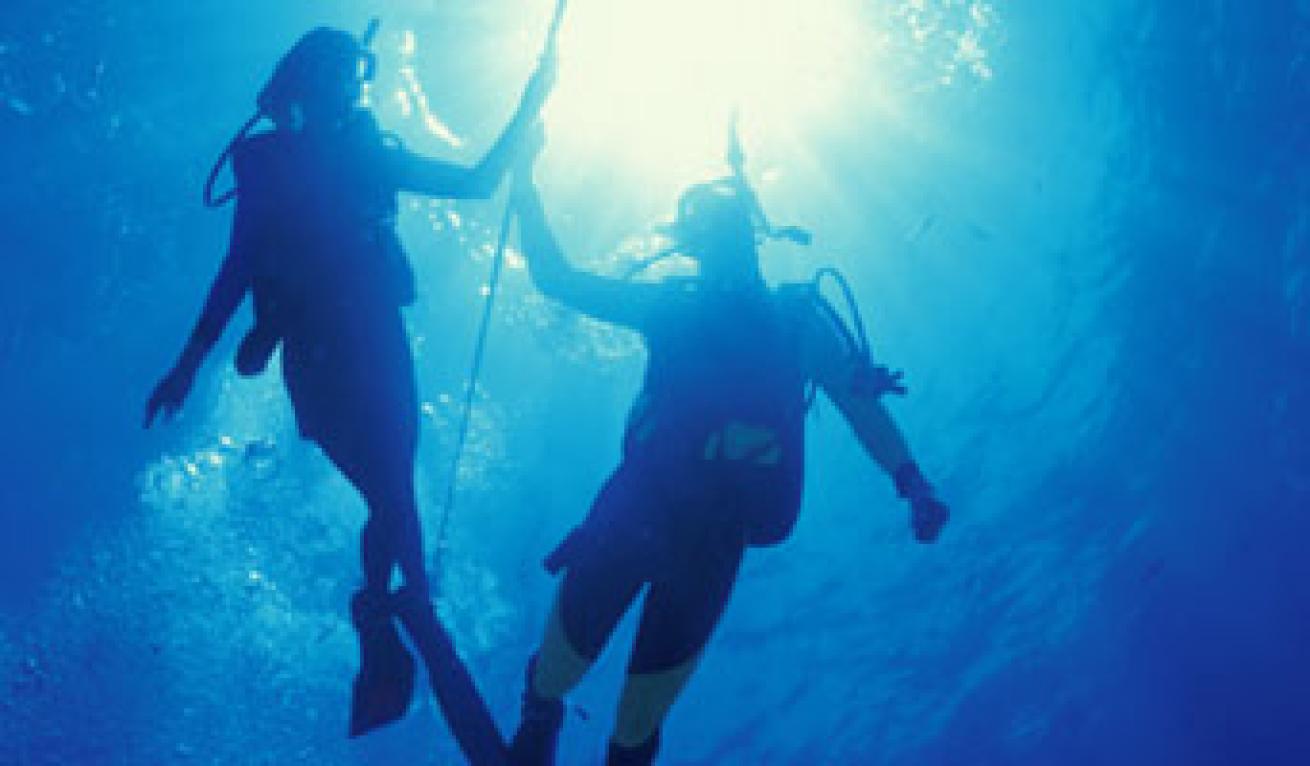
Got a diving question? Our resident dive pro has an answer.
By Michael Ange
Question:
I've heard divers always dive in pairs, so do I need a "buddy" to start lessons, or can I sign up on my own?
Answer:
It's true that recreational divers usually dive in pairs and that the other diver is referred to as your dive buddy. But no, you don't need to bring a partner to take classes or participate in the sport. Diving is a very social activity and when you arrive for your first scuba lesson, chances are there will be other students you can pair up with when you need to. By the end of the class, you'll have a whole new set of friends who are as eager to dive as you are, so finding a partner for future dives is a cinch.
Question:
I'm interested in learning to dive. There are three dive stores in my hometown--how do I know which one to use?
Answer:
By one estimate, there are 528 dive stores in the U.S., and while they come in all shapes and sizes, a good number of them are small "mom and pop" stores owned by good people who love to share the sport of diving with others. Any one of them can teach you to dive, but you want to find the one that will provide the best experience for you, and that takes a little legwork.
I suggest you pay each one a visit, because you can tell a lot about a dive shop just by walking in the door. Most dive stores aren't going to make the cover of Architectural Digest, but a good shop will be clean, neat and orderly. The right shop will look and feel like the kind of place you'd hang out in, because once you become a diver, chances are you'll be stopping in on a regular basis.
Next, pay attention to the staff. Their attitude is usually a direct reflection of the learning experience you'll receive. Walk up to the nearest employee and tell them you're interested in learning to dive. Ask any questions that you have. The staff at a good store will be responsive, courteous, knowledgeable and enthusiastic; never pushy or condescending. And if anyone tries to tell you that you have to buy a complete set of gear to start lessons, run--don't walk--to the nearest exit.
Once you've picked a shop you feel comfortable with, ask some follow-up questions: Do their classes fit your work schedule? If not, can they accommodate you with more flexible training options? What's the store's policy on remedial training in the unlikely event that you need extra time to learn? What happens if your boss sends you to Chicago and you have to miss a class?
Finally, if at all possible, talk with the actual instructor who will be teaching your class. Instructors, like stores, come in all shapes and sizes with lots of different personalities. The best instructors are easygoing, make their classes fun, yet are sticklers for making sure you meet all the training standards. Most shops have several instructors, so if it just doesn't click when you meet your instructor, feel free to ask if there is someone else you can train with.
Question:
NAUI, SSI, PADI, BSAC--what do all these names stand for and do they matter to me, a wannabe diver?
Answer:
These are all acronyms for dive training agencies, the people who produce the training materials and set the standards you'll have to meet to become a certified diver. Dive stores and instructors are usually affiliated with one or more of these agencies, often very proudly so, but the training standards and techniques are fairly universal, so take your pick. Ultimately, it's the quality of the instructor that will make the biggest impact on your learn-to-dive experience, not the name of the agency. Just ignore the alphabet soup on the dive store window and focus on finding a good instructor.
Question:
What's the difference between a resort course and open-water certification? Is one just as good as the other?
Answer:
They're two very different experiences, so the answer to your question depends on what you want to do with the sport.
A resort course, sometimes called a Discover Scuba course, is designed to give you a taste of diving. It usually consists of a short academic session, some time getting used to the gear in a swimming pool, and then you go diving in shallow, controlled and highly supervised conditions. Unless you seek additional training, you will always be limited to diving under the direct supervision of an instructor or a dive guide. As the name implies, these programs are often provided by resorts as a half-day or day-long activity that guests can squeeze in between windsurfing and salsa lessons.
Open-water certification is a full entry-level diving course. It requires more academics, a lot more pool time and the completion of four checkout dives where you must prove your skills to an instructor. When you pass, however, you're a fully certified diver, no supervision required.
The difference really boils down to this: Do you want to try diving for a day, or do you want to be a diver for the rest of your life? If you're not sure, try the resort course first. If you like it, you can always take the next step and sign up for open-water certification.
Question:
I would love to learn to dive, but I start college in the fall and between tuition and dorm fees, there's not a lot left in the budget. Any advice for getting certified on the cheap?
Answer:
I can do you one better: How would you like to learn to dive for free and earn credits toward your degree at the same time? It's easy. When you hit campus this fall, skip out of freshman orientation and find your way to the physical education department. Many, if not most, colleges and universities offer entry-level dive classes as a PE or elective course, which means it's covered by any financial aid that's coming your way. If your school doesn't have a dive program, check with other nearby universities, community colleges and even technical schools. I'll bet one of them has a scuba program, and you can probably arrange to transfer the credits. Now, all you have to do is convince your parents to pay for the class trip to Cozumel over spring break to complete your checkout dives.
Question:
So how deep do you go when you're diving? How long does a tank last? How fast can you swim under water?
Answer:
The answer to all of your questions is: It depends.
Taking them in order: For properly trained recreational divers, the traditional depth limit is 130 feet, but as a newly certified open-water diver you'll keep your dives to 60 feet, max. It's important to understand, however, that a successful dive isn't measured by how deep you go, but rather by how much fun you had exploring the underwater world. Popular dive sites for recreational divers are usually in the 40- to 80-foot range. That's a comfortable depth for most divers and it allows you a reasonable amount of playtime before you have to come back to the surface.
How deep you dive factors into your question about how long a tank of air lasts. The deeper you go, the faster you consume the air in your tank. So once again, a depth of 40 to 80 feet works out nicely for maximizing your dive time.
How fast can you swim under water? A healthy diver giving it his all can probably hit about 1, maybe 1.5 knots in short bursts, but speed isn't what most divers are after any more than depth is. Water is 800 times denser than air, and the gear divers wear creates additional drag, so moving fast takes an enormous amount of effort. It's worth it to shift into overdrive if you're keeping up with a manta ray, for example, but most of the time divers try to move at a slow, gliding pace.

